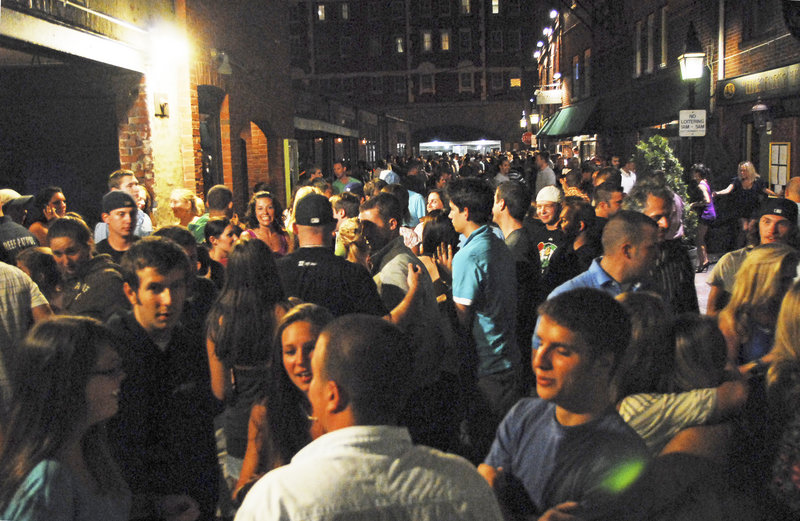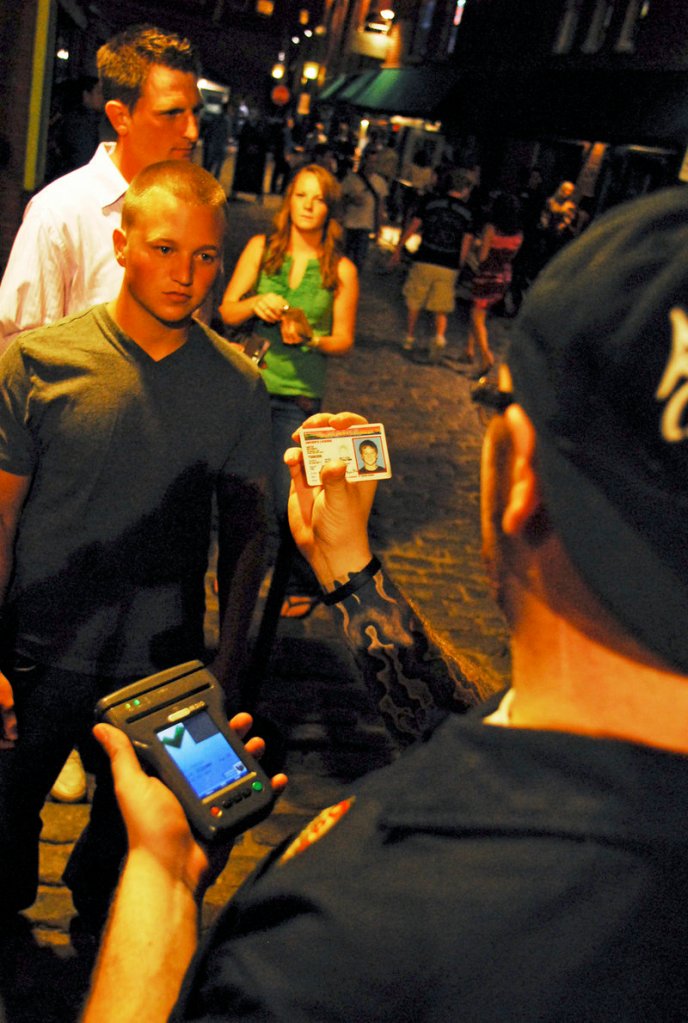PORTLAND – It’s Aug. 13, a warm Friday night in the Old Port, but to Sgt. Bob Doherty, it feels like a Tuesday — quiet.
On Wharf Street, the heart of the city’s nightlife district, a few hundred young people are hitting the clubs. But by Old Port standards, it’s a compact and subdued crowd.
In a relatively small area where alcohol, people and hormones can come together with violent consequences, the most dangerous thing this evening has been numerous stiletto heels skittering crazily across cobblestones.
This summer, like other summers, the police department has beefed up its Old Port presence to help control the crowd. Doherty and a half-dozen other Portland police officers have been here since about 10 p.m. — the lull before the approach of last call.
At midnight, an hour before the bars close, activity picks up. Lines form at two popular clubs, Oasis and 51 Wharf, as young people surge to make an appearance in the waning hours of the night.
Soon the bars start to empty, with groups of friends leaving in small packs. At 1 a.m., there’s a flood of people a few hundred strong. 1:20, they’re gone. Wharf Street is deserted. No fights, no shoves, no hard looks.
The Old Port has been a quieter place so far this year compared with last summer, with less crime and fewer conflicts, according to police statistics and the people who work or patrol there.
A comparison of police calls in the area from May 23 to July 28 last year and the same period this year shows the number of reported incidents dropped 27 percent, from 206 to 150. For this report, the Old Port is defined as the area bordered by Commercial, Congress, Center and Franklin streets. Within that area, there are dozens of drinking establishments.
“The officers are noticing smaller crowds and we’re encountering fewer problems overall in the Old Port,” police Cmdr. Vern Malloch said.
Crimes that often reflect on the area’s nightlife, such as assaults, criminal mischief and disorderly conduct, dropped 18 percent, from 90 incidents to 74, according to department statistics.
Police have taken extra steps to keep the peace in the area since a man was killed May 23 in Monument Square. Police charged a Gray man, who they say had been out partying in the Old Port, with manslaughter.
Authorities say William Googins, 20, punched Eric Benson once in the face. Benson fell, hit his head on the bricks and later died. According to police accounts, Googins and friends had been at the Oasis before walking to Monument Square. They began harassing a female companion of Benson’s, police said, and then Googins hit him.
The incident may have turned some people off to the city’s nightlife, keeping crowds down. The following Friday, which kicked off the Memorial Day weekend, was extremely quiet, police said.
Some Old Port patrons and security workers also raised another point: Benson’s death and Googins’ arrest may have given potential rowdies pause.
“It’s in the back of everyone’s mind,” said James Kingsbury, security manager at 51 Wharf.
Adam St. Laurent of Acton was on Wharf Street with some friends last weekend. In the past, he said, there seemed to have been more “‘bros’ trying to fight.” This time, he’d bumped a few people and spilled a drink or two without anyone taking offense. People are thinking twice before throwing a punch, he said.
“People got the fear that a fist can kill someone,” St. Laurent said.
There are a number of other factors at work, including, surprisingly, the weather.
“This year in particular would be a significant decrease (in police calls) mainly because business is so far down, and business is down because the weather is so nice,” said Douglas Fuss, owner of Bull Feeney’s Irish pub. “When it’s cloudy and cool, people come into town.”
On this Friday night, Sgt. Doherty speculated that the warm weather — people in T-shirts were still comfortable — meant that Old Orchard Beach was likely mobbed.
And the recession may have left some people with less money to spend, so they’re scaling back their weekend revelry, Fuss said.
“A fair number of people are choosing to take one night off,” he said.
EMPHASIS ON SECURITY
Police also launched several initiatives after the Monument Square death. They have, for instance, asked bars to text police and one another when they kick out rowdy patrons.
There have been few such incidents, said Fuss, chairman of the city’s Nightlife Oversight Committee, a collection of liquor license holders from the Old Port and Arts District that was created early this decade.
He is aware of three occasions this summer when the network has been used to alert other bars about problem patrons.
On Wharf Street, security workers from Oasis and 51 Wharf chatted, tipping each other off to potential troublemakers.
“We’ve been seeing the Old Port come together a bit more,” said Chip Currier, one of the security workers at Oasis, as he kept an eye on the line outside the club.
Both clubs are using ID scanners that let security know if a person trying to get into a bar has caused problems before. The devices store information about IDs that have been scanned and flag anyone with past problems.
Security workers are also checking out Westbrook Police Department’s Facebook page. The department is diligent about putting up mug shots of wanted people, and security wants to keep them out of the bar, Currier said.
The attention to security is spreading through the Old Port, said Mike White, security manager at Oasis. Just this month, Bill’s Pizza on Commercial Street began using security personnel to monitor the large crowds that gather there after the bars close and defuse any fights before they start.
AN OUNCE OF PREVENTION
Fuss said that by and large, the Old Port has few problems, and the death on Monument Square was a rare incident.
Today’s Old Port is not the Old Port of the 1990s, said White and Currier.
“It’s not like it used to be. No one was held responsible for anything that happened,” Currier said.
Today, Old Port business owners will call out their peers for not keeping things safe, White said. Having a dangerous reputation isn’t good for business, he noted. Many of the businesses have both night and day operations, and a bad reputation will keep people away at all times.
Fuss said members of the nightlife committee are also constantly working on the issue of overserving alcohol. The group gets information out to clubs and bars about responsible bar management, and about how to identify people who are visibly intoxicated so they can be cut off. There are training classes for bar staff, and the committee suggests that bar owners pay for staff to attend.
“It’s a complicated problem. It’s not just the bars — it’s easy to make the bars the lightning rod for it,” Fuss said. “People are coming down for the nightlife scene, but there’s lots of people who consume alcohol on their own and then come down to the district.”
That happens more in a down economy, Fuss said.
Not everyone has seen a decline in Old Port activity.
Gerard Kiladjian, general manager of the upscale Portland Harbor Hotel, said he hasn’t seen anything different from past years. His guests are making the same number of complaints about noise and late-night rowdiness, he said. He did note that it’s been a strong year for the hotel, with the rooms often filled, so more guests may result in more complaints.
As for the reduction in police calls, Kiladjian said the hotel has called less often about noise complaints, because nothing was ever done. That may have affected the statistics, he said.
ZERO TOLERANCE PAYING OFF
Jan Beitzer, executive director of Portland’s Downtown District, said she’s heard the Old Port has been relatively calm, and she was happy to see that statistics reflect that.
Much of the credit, she said, should go to the police department’s approach to the area. They’re prosecuting more quality-of-life crimes, she said, such as charging people with urinating in public. And while people in minor scuffles may have been let off with a warning previously, they’re now being charged, Beitzer said.
“It’s those small crimes that escalate,” she said.
Those efforts and the number of officers working in the Old Port has helped keep crime down, Malloch said. The department normally increases staff in the area during busy periods, such as the summer. Because the crowds have been smaller, the increased police presence can have a greater impact.
“We have the same number of officers (as last summer) with fewer crowds, so we can focus on the few problem individuals,” Malloch said. “It takes the atmosphere of lawlessness away and replaces it with some semblance of public order.”
Doherty, the sergeant, noted that the zero-tolerance policy has been working to prevent trouble. If someone is caught with a false ID, the bouncer doesn’t just take it — he calls police, who issue the person a summons for giving false written information.
If someone is charged with a crime in the Old Port, they’re barred from the Old Port through bail conditions. Malloch said officers ask for that restriction each time they make an arrest connected to the Old Port nightlife, and bail commissioners generally agree.
White said the police presence is just right — enough officers to be visible, allowing patrons to feel secure, but not so many that people worry the area is unsafe.
ASSESSING THE STATISTICS
Public order crimes generally dropped from last year, though not in all categories.
There were three aggravated assaults — attacks when a weapon was used or the injuries were severe — compared with two last year.
Misdemeanor assaults stayed the same at 12. Criminal trespasses climbed from six to 12, and there were five robberies compared with just one last summer. The last statistic reflects a national and statewide increase in robberies, Malloch said.
Criminal mischief reports dropped from 17 to nine, disorderly conduct from 12 reports to five, and obstructing government administration from two reports to none.
The number of casualty reports, when somebody has been injured or is found unconscious, dropped from 17 to eight.
“There are a lot of things going on,” Malloch said. “We can speculate but it’s difficult to say for sure if it’s any one thing or a combination of all of them.”
Staff Writer David Hench can be contacted at 791-6327 or at:
dhench@pressherald.com
Staff Writer Matt Wickenheiser can be contacted at 791-6316 or at:
mwickenheiser@pressherald.com.
Send questions/comments to the editors.



